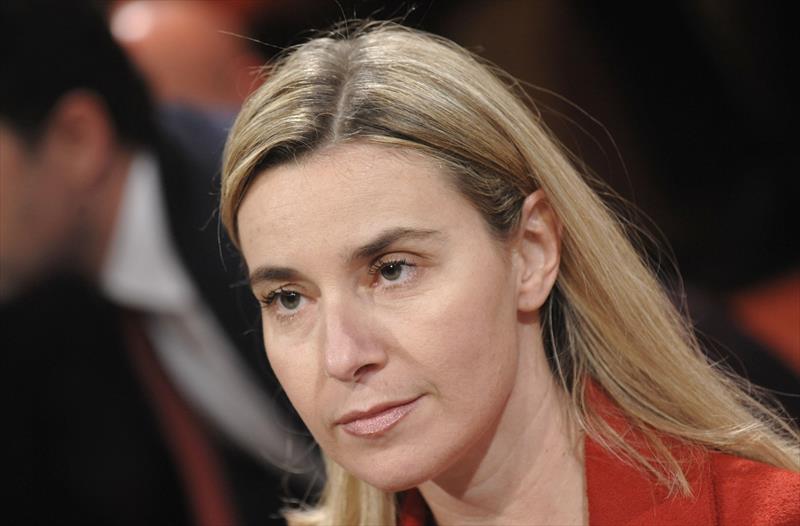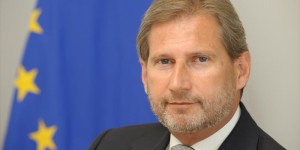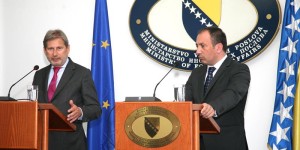This interview was originally published in the daily Nezavisne Novine on 23 February 2015
There is a bit of a misunderstanding as to whether the new European approach to Bosnia means tougher or lighter conditions for Bosnian accession to the EU. Some say that is now easier, since Sejdic and Finci is not the primary condition any more. But others say that it is in fact more difficult because now we need to make tough reforms AND solve Sejdic Finci case before we can become a membership candidate. What is the real truth?
The wide-spread, citizen-led protests of 2014 underlined the fragility of the socio-economic situation and emphasised the need to focus on socio-economic reforms and to make functionality improvements in BiH. The EU’s Foreign Ministers, through Conclusions of the Foreign Affairs Council of 15 December 2014, therefore decided on a renewed approach towards Bosnia and Herzegovina.
In order to move forward on the path towards EU accession, the Foreign Affairs Council said that a written commitment is to be agreed by the BiH Presidency, signed by the political parties’ leaders and endorsed by the BiH Parliament. It needs to clearly state the commitment and the engagement of the leadership and of the population – who are more than ready to move towards the European Union – to reforms. These include reforms under the Copenhagen criteria – socio-economic reforms, rule of law, good governance – and also agreed functionality issues including the EU coordination mechanism.
We are looking forward to seeing the Written Commitment being endorsed by the BiH Parliament on 23 February. This would allow me to inform the EU’s Foreign Ministers appropriately, and the Member States can then decide on the entry into force of the SAA.
The framework for the socio-economic reforms is provided by the Compact for Growth and Jobs, particularly its six key recommendations that we believe could begin to revitalise the economy and to spur investment and jobs. People in Bosnia and Herzegovina expect better lives and future perspectives for themselves and their children in the first place. Reforms will be designed to achieve that.
We were always clear in saying that this does not mean lowering the bar and changing the EU conditionality – that is not something that is on the agenda – but it means that we looked at how the sequence can be changed or to make sure that concrete steps can be taken.
The Sejdic-Finci judgement indeed has not been removed from the agenda. When requesting the Commission’s Opinion on an eventual membership application, the Council will ask the Commission to pay particular attention to the state of play on implementation of the Sejdic-Finci judgement.
If you would be asked to make a list of priorities of the EEAS in the foreign policies, where would Bosnia be? Many say that at this point for the EU much more important question is the situation in Ukraine, fight against ISIS, Belgrade Pristina dialogue, new trade relations with the USA… How important Bosnia really is for EU?
It is true that the EU and our international partners are engaged in multiple issues around the world. But the fact that I am visiting Bosnia and Herzegovina twice in three months clearly illustrates how important your country is to the EU and to me personally.
However, this does not mean that Bosnia and Herzegovina can remain at a standstill. I recall the recent visit of my colleagues, German Foreign Minister Steinmeier and British Foreign Secretary Hammond, to Bosnia and Herzegovina; they rightly said in Sarajevo that the initiative represents a window of opportunity for Bosnia and Herzegovina, but that window will not stay open forever.
At the moment, Bosnia and Herzegovina is high on the agenda for EU ministers and the country should maximise that opportunity because the global agenda is lengthening. But it is not really about us – it is about citizens of Bosnia and Herzegovina who want a better life and who are losing patience.
Some think that it would be wrong to put too much hope in our political leaders because time and again they have showed unable to make compromises? Are you really sure that this time they really mean what they say? Or is it that EU feels that at this point it cannot expect too much from our civil society?
For the renewed approach and reform agenda to succeed, leaders have to lead. The entire institutional and political leadership of BiH at all levels will need to jointly and constructively work on the European future of this country for the benefit of all. What needs to change is output by BiH leaders and institutions. They need to carry out the necessary reforms.
Civil society will be closely involved in the development of the reform agenda and we value their advocacy. We regularly consult with members of civil society on various issues already, including for example through the Structured Dialogue on Justice and Additional Rule of Law Matters. Commissioner Hahn and I met with civil society members when we visited Bosnia and Herzegovina in December and I will meet with people from the creative and cultural sectors today. It is very important for them to raise their voices, and for institutions to listen.
The time is now. The citizens and the leaders must seize their EU future – and fast.




